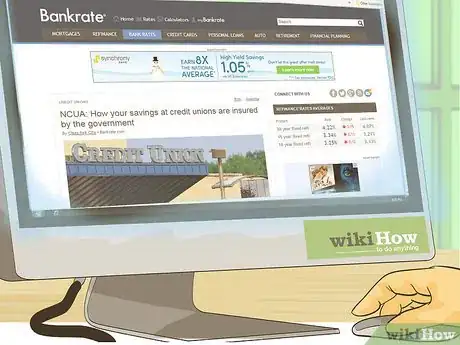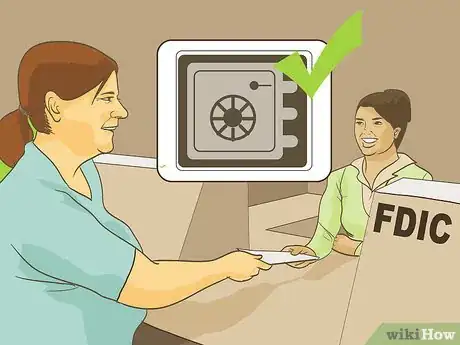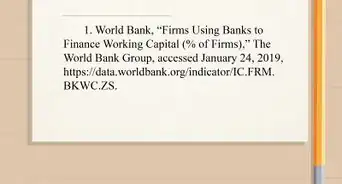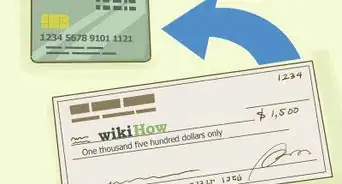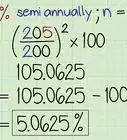This article was co-authored by Ara Oghoorian, CPA. Ara Oghoorian is a Certified Financial Accountant (CFA), Certified Financial Planner (CFP), a Certified Public Accountant (CPA), and the Founder of ACap Advisors & Accountants, a boutique wealth management and full-service accounting firm based in Los Angeles, California. With over 26 years of experience in the financial industry, Ara founded ACap Asset Management in 2009. He has previously worked with the Federal Reserve Bank of San Francisco, the U.S. Department of the Treasury, and the Ministry of Finance and Economy in the Republic of Armenia. Ara has a BS in Accounting and Finance from San Francisco State University, is a Commissioned Bank Examiner through the Federal Reserve Board of Governors, holds the Chartered Financial Analyst designation, is a Certified Financial Planner™ practitioner, has a Certified Public Accountant license, is an Enrolled Agent, and holds the Series 65 license.
There are 13 references cited in this article, which can be found at the bottom of the page.
This article has been viewed 32,154 times.
As banks grow, more and more people are looking to change their current bank or credit union to explore new options. You might want to find lower fees, higher savings rates, or better customer service. Regardless of your reasons, you might find what you are looking for while you are researching banks and credit unions. Depending on your banking needs and the features you want your bank or credit union to have, you can begin to look for a financial institution that is right for you.
Steps
Comparing Banks and Credit Unions
-
1Compare their sizes. Banks can vary in size from small local banks to very large international corporations that are in hundreds of locations. Credit unions tend to be smaller and cater to a local community, rather than a national population.
- Larger institutions tend to offer more services and features, while small institutions tend to offer more basic options.
- For instance, a small institution might not be able to provide investment consulting or be able to exchange foreign currencies.
-
2Address membership concerns. Credit unions are a member run not-for-profit financial institution. This means that the union's members govern the union, rather than it being governed by a large corporation. Credit unions often have membership requirements that determine eligibility.[1]
- Banks do not have eligibility requirements like credit unions do. However, they are for-profit corporations that are run by shareholders.
- Credit unions may have eligibility requirements based on the community you live in, your employer, occupation, religious institution, or membership to a fraternal organization.
Advertisement -
3Research the services they offer. Credit unions and banks will offer different features, though at their core they are both financial institutions. For example, some smaller credit unions may not offer lending for mortgages like big banks do. You will need to make a list of the features that you consider important for your financial institution, and use this list to narrow your search.
- If you want an institution that offers online or mobile banking, make that a priority in your search.
- If you want to be able to use ATMs without fees, look for institutions that reimburse you for ATM fees or are part of a large ATM network.
Choosing a Credit Union
-
1Learn the benefits of credit unions. Credit unions are not-for-profit institutions that are often cooperatives managed by their members. They often have lower rates than banks, lower interest rates, and more satisfied members.[2]
- However, credit unions may be limited in the number of services that they can offer, have eligibility requirements for membership, and may not be in accessible locations.
-
2Determine eligibility. Some credit unions limit their membership to certain companies, occupations, certain affiliations, or industries. While credit union eligibility has expanded in recent years, you will need to speak with a credit union representative to make sure that you are eligible to open an account there.
- You may also be eligible to join a credit union if your spouse or parent is a member at that union.
- The credit union representative will be able to tell you if you are eligible to join that particular union based on your occupation and membership affiliations to partnership organizations, like a fraternal order or the military.
- If you are ineligible at that credit union, you’ll have to look for different unions to join.
-
3Assess their accessibility. One reason that credit unions are typically less popular is that they are intended to serve a local area so they can be less accessible when you’re outside that network. However, many credit unions are part of co-ops or shared networks that allow members to deposit and withdraw from their accounts at any of the member institutions.
- Ask if they are a member of a shared branch network. There are often fewer locations for credit unions than there are for banks.With a shared branch network, you can go to any of the member credit union locations to access your account.
- Ask whether they belong to an ATM network. If they are, you can withdraw or deposit money at different ATMs even if they aren’t specific to your credit union.[3]
-
4Choose an insured credit union. Credit unions that are insured are able to pay back members if the credit union happens to fail. The National Credit Union Administration[4] is the independent federal agency that regulates and charters federal credit unions. Nearly 98% of all credit unions in the US are regulated and insured through the NCUA. Check to see if your national government regulates credit unions through a similar agency.[5]
- Like the FDIC, the NCUA has a searchable database that provides information about the size, financial health, and their insurance status.[6] Use this resource to research credit unions in your area.
-
5Ask about banking procedures. Here, you’ll need to see whether the credit union offers the services that are important to you. You can ask whether they offer online banking, 24 hour support, or financial and investment services. If a credit union doesn’t offer a particular service, you might consider it to be a deal breaker. If you can live without this service, keep the credit union on your list of potential institutions.[7]
- While you can likely find the information you want on the credit union’s website, it’s easier to speak with a credit union representative and ask them your specific questions.
-
6Compare interest rates. Most credit unions offer competitive interest rates that are better than banks. They also tend to offer higher savings rates. Ask the credit union about the rates that they offer and use that information to compare unions.[8]
- Over time, fewer banks and credit unions are offering interest-yielding bank accounts. However, credit unions are still more likely to offer competitive rates to their members.
-
7Look into fees. Across the board, credit unions tend to have lower fees than big banks. You will want to find out whether there are fees associated with going below a certain account balance, if checking accounts are free, if there are monthly account maintenance fees, and if there are overdraft fees.
- Take careful notes about what these fees are and how much they will cost you. Factor in this information when you are comparing credit unions.
- Keep in mind that some fees will not apply to you. For example, if you never use ATMs an ATM fee won’t make any significant difference in your decision.
Choosing a Bank
-
1Determine your ideal bank size. When you are looking into your bank, you have the option of choosing an institution that is smaller and local or national and large.[9]
- Local banks may offer smaller or fewer fees, but may also offer fewer financial services like foreign currency exchange or investment consulting.
- Large banks have more branches, which is important if you travel frequently or are planning on moving, and offer more financial services to their customers.[10]
- Consider how you interact with your bank. Do you visit the bank/credit union weekly or do you mostly do your banking online? If you make frequent visits to your financial institution, then you will likely want to choose one with a convenient location and/or multiple locations.
-
2Choose a bank that offers online banking. If you prefer to do your banking business from your computer, you should consider a bank that offers this capability. You will be able to find out whether a bank offers online banking by visiting their website or talking with a bank representative.
- There are also online banks that do not have traditional brick and mortar locations. These banks are entirely online and offer some of the same services that a traditional bank does. This might be a good option for you if you do most, or all, of your banking online already.
-
3Look into account fees. You want to choose a bank that does not charge monthly maintenance fees, has low overdraft fees, and doesn’t have a minimum balance requirement. Big banks are notorious for charging fees that their customers are unaware of when they open accounts. Rather than learning later on that you’re being charged hidden fees, investigate fees while you’re choosing a bank.[11]
- Choose a bank that does not charge monthly maintenance fees for having an account. Some fees are avoidable, like if you use direct deposit.
- You also want to find a bank that doesn’t have a minimum balance requirement, or has one that is very low. When you go under this amount, or you overdraft on your account, you do not want your bank to charge you expensive overdraft fees.
-
4Compare interest rates. Like with a credit union, banks will offer different rates for interest-bearing accounts. While these interest rates have become increasingly small over time, they can pay off if you keep a significant amount of money in a savings account.[12]
- Keep in mind that the bank might require that you maintain a certain account balance in order to be eligible for their advertised interest rate. If your account goes below this amount, you would become ineligible to accrue interest.[13]
-
5Ask about their ATM network. If you use an ATM frequently to access your account or withdraw money, look for an institution with a wide ATM network. Be sure to ask about their policies regarding using an ATM in a different network — some banks may charge a fee if you use an ATM that is no in their network.
- Some banks will reimburse the fees you are charged for using another bank’s ATM, or are part of an ATM network that allows you to withdraw or deposit money at a large number of different ATMs.[14]
-
6Choose a bank that is insured. Bank guarantees ensure that if the bank were to fail, you would receive your money back. This is especially important in a recession or a volatile economy, where it can be hard to feel confident that your money is safe. Check to make sure the bank is insured, and see whether they have any limits on insured account amounts.
- The Federal Deposit Insurance Corporation (FDIC) is a federal agency that regulates nearly every bank. You can also search their institution directory to find a report of the bank’s financial outlook.[15] Check with your nation’s Department of Treasury or Finance to see whether there is a comparable agency that guarantees insurance.
Expert Q&A
-
QuestionHow should I choose my first credit card?
 Ara Oghoorian, CPAAra Oghoorian is a Certified Financial Accountant (CFA), Certified Financial Planner (CFP), a Certified Public Accountant (CPA), and the Founder of ACap Advisors & Accountants, a boutique wealth management and full-service accounting firm based in Los Angeles, California. With over 26 years of experience in the financial industry, Ara founded ACap Asset Management in 2009. He has previously worked with the Federal Reserve Bank of San Francisco, the U.S. Department of the Treasury, and the Ministry of Finance and Economy in the Republic of Armenia. Ara has a BS in Accounting and Finance from San Francisco State University, is a Commissioned Bank Examiner through the Federal Reserve Board of Governors, holds the Chartered Financial Analyst designation, is a Certified Financial Planner™ practitioner, has a Certified Public Accountant license, is an Enrolled Agent, and holds the Series 65 license.
Ara Oghoorian, CPAAra Oghoorian is a Certified Financial Accountant (CFA), Certified Financial Planner (CFP), a Certified Public Accountant (CPA), and the Founder of ACap Advisors & Accountants, a boutique wealth management and full-service accounting firm based in Los Angeles, California. With over 26 years of experience in the financial industry, Ara founded ACap Asset Management in 2009. He has previously worked with the Federal Reserve Bank of San Francisco, the U.S. Department of the Treasury, and the Ministry of Finance and Economy in the Republic of Armenia. Ara has a BS in Accounting and Finance from San Francisco State University, is a Commissioned Bank Examiner through the Federal Reserve Board of Governors, holds the Chartered Financial Analyst designation, is a Certified Financial Planner™ practitioner, has a Certified Public Accountant license, is an Enrolled Agent, and holds the Series 65 license.
Certified Financial Planner & Accountant
-
QuestionWhat is the best credit union to join?
 Ara Oghoorian, CPAAra Oghoorian is a Certified Financial Accountant (CFA), Certified Financial Planner (CFP), a Certified Public Accountant (CPA), and the Founder of ACap Advisors & Accountants, a boutique wealth management and full-service accounting firm based in Los Angeles, California. With over 26 years of experience in the financial industry, Ara founded ACap Asset Management in 2009. He has previously worked with the Federal Reserve Bank of San Francisco, the U.S. Department of the Treasury, and the Ministry of Finance and Economy in the Republic of Armenia. Ara has a BS in Accounting and Finance from San Francisco State University, is a Commissioned Bank Examiner through the Federal Reserve Board of Governors, holds the Chartered Financial Analyst designation, is a Certified Financial Planner™ practitioner, has a Certified Public Accountant license, is an Enrolled Agent, and holds the Series 65 license.
Ara Oghoorian, CPAAra Oghoorian is a Certified Financial Accountant (CFA), Certified Financial Planner (CFP), a Certified Public Accountant (CPA), and the Founder of ACap Advisors & Accountants, a boutique wealth management and full-service accounting firm based in Los Angeles, California. With over 26 years of experience in the financial industry, Ara founded ACap Asset Management in 2009. He has previously worked with the Federal Reserve Bank of San Francisco, the U.S. Department of the Treasury, and the Ministry of Finance and Economy in the Republic of Armenia. Ara has a BS in Accounting and Finance from San Francisco State University, is a Commissioned Bank Examiner through the Federal Reserve Board of Governors, holds the Chartered Financial Analyst designation, is a Certified Financial Planner™ practitioner, has a Certified Public Accountant license, is an Enrolled Agent, and holds the Series 65 license.
Certified Financial Planner & Accountant Research the different rewards and perks that banks and credit unions offer customers.
Research the different rewards and perks that banks and credit unions offer customers.
Warnings
- Don’t be lured in by promotions. While these can be nice, these rates won’t last and unless the account is perfect for you in every other way, it won’t end up being a good deal in the long run.⧼thumbs_response⧽
- Don’t pay for additional services that you don’t need.⧼thumbs_response⧽
References
- ↑ http://www.bankrate.com/finance/savings/can-you-join-a-credit-union.aspx
- ↑ http://www.bankrate.com/finance/credit-unions/pros-cons-credit-unions-2.aspx
- ↑ http://www.bankrate.com/finance/credit-unions/pros-cons-credit-unions-6.aspx
- ↑ https://www.ncua.gov
- ↑ http://www.bankrate.com/finance/credit-unions/ncua-protects-savings-at-credit-unions.aspx
- ↑ https://www.ncua.gov/analysis/Pages/research.aspx
- ↑ https://www.nerdwallet.com/blog/banking/how-choose-credit-union-or-community-bank/
- ↑ https://www.mycreditunion.gov/about-credit-unions/Pages/interest-rate-comparison.aspx
- ↑ https://www.thebalance.com/is-a-bank-or-credit-union-better-2385851
- ↑ https://www.thebalance.com/is-a-bank-or-credit-union-better-2385851
- ↑ http://www.forbes.com/sites/laurashin/2014/06/30/how-to-choose-a-bank-account-10-things-to-look-for/#5e626ceb2cfa
- ↑ http://www.bankrate.com/finance/savings/bank-shopping-here-s-how-to-choose-2.aspx
- ↑ http://www.consumerreports.org/cro/magazine/2012/02/bank-accounts/index.htm
- ↑ http://www.forbes.com/sites/laurashin/2014/06/30/how-to-choose-a-bank-account-10-things-to-look-for/#5e626ceb2cfa
- ↑ https://www.fdic.gov/
About This Article
Choosing between a bank or credit union really comes down to what you value most in a financial institution and what kind of experience you're looking for. Credit unions are not-for-profit institutions that typically have lower rates and more satisfied customers, although they typically offer fewer services and have fewer locations than bigger banks. Big banks, on the other hand, offer more services and are generally more convenient because they have more locations and ATMs. You can find smaller banks with lower rates, but they may not offer as many features. For more expert banking tips, check out the full article below!






